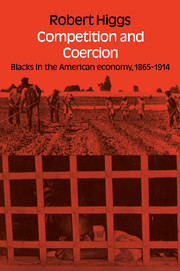Book contents
- Frontmatter
- Contents
- List of tables
- Preface
- “Race” and “racial discrimination”: A prefatory note on usage
- 1 Approaching the facts
- 2 The people
- 3 The people at work, 1865–1880
- 4 The people at work, 1880–1914
- 5 The fruits of their labors
- 6 Overview and interpretation
- Technical appendix
- Notes
- Select bibliography
- Index
6 - Overview and interpretation
Published online by Cambridge University Press: 07 October 2011
- Frontmatter
- Contents
- List of tables
- Preface
- “Race” and “racial discrimination”: A prefatory note on usage
- 1 Approaching the facts
- 2 The people
- 3 The people at work, 1865–1880
- 4 The people at work, 1880–1914
- 5 The fruits of their labors
- 6 Overview and interpretation
- Technical appendix
- Notes
- Select bibliography
- Index
Summary
One of the most significant things I saw in the South–and I saw it everywhere–was the way in which the white people were torn between their feeling of race prejudice and their downright economic needs.
Ray Stannard Baker, 1908In Chapter 1 I sketched in a preliminary way how one might usefully approach the facts of black economic history in the half century after 1865. The objective there was to provide a tentative interpretive frame-work into which a variety of diverse facts might be fitted, to simplify the task of ordering the facts and relating them to one another in causal sequences. Within this analytical framework, Chapters 2–5 have presented numerous facts as well as several theoretical extensions and complications relevant to questions other than those posed at the out-set. This final chapter returns to the initial focus, seeking to integrate the factual material and the partial models that constitute the heart of the book into an interpretive whole. To attain interpretive simplicity and still be true to the facts in all their historical diversity is, of course, impossible. The present objective is to incorporate as much genuine complexity as possible within an intelligible interpretation.
What was accomplished?
Emancipation granted the black people both very little and a great deal. With freedom came no land or other tangible resources; except for the sporadic, inconsistent, and transitory efforts of the Freedmen's Bureau and the army of occupation, no protection against the intimidation and violent abuse of Southern whites; except for the limited efforts of missionaries, philanthropists, and the bureau, no education.
- Type
- Chapter
- Information
- Competition and CoercionBlacks in the American economy 1865-1914, pp. 118 - 134Publisher: Cambridge University PressPrint publication year: 1977



